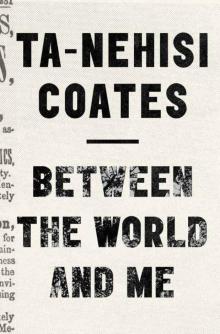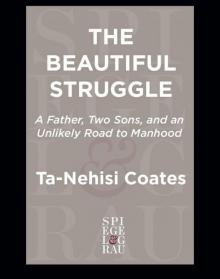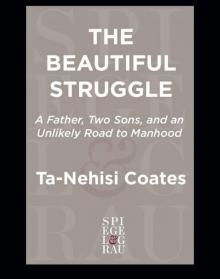- Home
- Ta-Nehisi Coates
Between the World and Me
Between the World and Me Read online
Between the World and Me is a work of nonfiction. Some names and identifying details have been changed.
Copyright © 2015 by Ta-Nehisi Coates
All rights reserved.
Published in the United States by Spiegel & Grau, an imprint of Random House, a division of Penguin Random House LLC, New York.
SPIEGEL & GRAU and the HOUSE colophon are registered trademarks of Penguin Random House LLC.
The title of this work is drawn from the poem “Between the World and Me” by Richard Wright, from White Man Listen! copyright © 1957 by Richard Wright. Used by permission of John Hawkins & Associates, Inc., and the Estate of Richard Wright.
Grateful acknowledgment is made to the following for permission to reprint previously published material:
Chris Calhoun Agency: Excerpt from “Ka’ Ba” by Amiri Baraka, copyright © Estate of Amiri Baraka. Reprinted by permission of the Chris Calhoun Agency.
John Hawkins & Associates, Inc., and the Estate of Richard Wright: Excerpt from “Between the World and Me” from White Man Listen! by Richard Wright, copyright © 1957 by Richard Wright. Reprinted by permission of John Hawkins & Associates, Inc., and the Estate of Richard Wright.
Sonia Sanchez: Excerpt from “Malcolm” from Shake Loose My Skin by Sonia Sanchez (Boston: Beacon Press, 1999), copyright © 1999 by Sonia Sanchez. Reprinted by permission of Sonia Sanchez.
ISBN 9780812993547
eBook ISBN 9780679645986
randomhousebooks.com
spiegelandgrau.com
Book design by Caroline Cunningham, adapted for eBook
Cover design: Greg Mollica
Cover art: Bridgeman Images
v4.1
a
Contents
Cover
Title Page
Copyright
Epigraph
Chapter I
Chapter II
Chapter III
Dedication
By Ta-Nehisi Coates
About the Author
And one morning while in the woods I stumbled suddenly upon the thing,
Stumbled upon it in a grassy clearing guarded by scaly oaks and elms
And the sooty details of the scene rose, thrusting themselves between the world and me….
—RICHARD WRIGHT
I.
Do not speak to me of martyrdom,
of men who die to be remembered
on some parish day.
I don’t believe in dying
though, I too shall die.
And violets like castanets
will echo me.
SONIA SANCHEZ
Son,
Last Sunday the host of a popular news show asked me what it meant to lose my body. The host was broadcasting from Washington, D.C., and I was seated in a remote studio on the far west side of Manhattan. A satellite closed the miles between us, but no machinery could close the gap between her world and the world for which I had been summoned to speak. When the host asked me about my body, her face faded from the screen, and was replaced by a scroll of words, written by me earlier that week.
The host read these words for the audience, and when she finished she turned to the subject of my body, although she did not mention it specifically. But by now I am accustomed to intelligent people asking about the condition of my body without realizing the nature of their request. Specifically, the host wished to know why I felt that white America’s progress, or rather the progress of those Americans who believe that they are white, was built on looting and violence. Hearing this, I felt an old and indistinct sadness well up in me. The answer to this question is the record of the believers themselves. The answer is American history.
There is nothing extreme in this statement. Americans deify democracy in a way that allows for a dim awareness that they have, from time to time, stood in defiance of their God. But democracy is a forgiving God and America’s heresies—torture, theft, enslavement—are so common among individuals and nations that none can declare themselves immune. In fact, Americans, in a real sense, have never betrayed their God. When Abraham Lincoln declared, in 1863, that the battle of Gettysburg must ensure “that government of the people, by the people, for the people, shall not perish from the earth,” he was not merely being aspirational; at the onset of the Civil War, the United States of America had one of the highest rates of suffrage in the world. The question is not whether Lincoln truly meant “government of the people” but what our country has, throughout its history, taken the political term “people” to actually mean. In 1863 it did not mean your mother or your grandmother, and it did not mean you and me. Thus America’s problem is not its betrayal of “government of the people,” but the means by which “the people” acquired their names.
This leads us to another equally important ideal, one that Americans implicitly accept but to which they make no conscious claim. Americans believe in the reality of “race” as a defined, indubitable feature of the natural world. Racism—the need to ascribe bone-deep features to people and then humiliate, reduce, and destroy them—inevitably follows from this inalterable condition. In this way, racism is rendered as the innocent daughter of Mother Nature, and one is left to deplore the Middle Passage or the Trail of Tears the way one deplores an earthquake, a tornado, or any other phenomenon that can be cast as beyond the handiwork of men.
But race is the child of racism, not the father. And the process of naming “the people” has never been a matter of genealogy and physiognomy so much as one of hierarchy. Difference in hue and hair is old. But the belief in the preeminence of hue and hair, the notion that these factors can correctly organize a society and that they signify deeper attributes, which are indelible—this is the new idea at the heart of these new people who have been brought up hopelessly, tragically, deceitfully, to believe that they are white.
These new people are, like us, a modern invention. But unlike us, their new name has no real meaning divorced from the machinery of criminal power. The new people were something else before they were white—Catholic, Corsican, Welsh, Mennonite, Jewish—and if all our national hopes have any fulfillment, then they will have to be something else again. Perhaps they will truly become American and create a nobler basis for their myths. I cannot call it. As for now, it must be said that the process of washing the disparate tribes white, the elevation of the belief in being white, was not achieved through wine tastings and ice cream socials, but rather through the pillaging of life, liberty, labor, and land; through the flaying of backs; the chaining of limbs; the strangling of dissidents; the destruction of families; the rape of mothers; the sale of children; and various other acts meant, first and foremost, to deny you and me the right to secure and govern our own bodies.
The new people are not original in this. Perhaps there has been, at some point in history, some great power whose elevation was exempt from the violent exploitation of other human bodies. If there has been, I have yet to discover it. But this banality of violence can never excuse America, because America makes no claim to the banal. America believes itself exceptional, the greatest and noblest nation ever to exist, a lone champion standing between the white city of democracy and the terrorists, despots, barbarians, and other enemies of civilization. One cannot, at once, claim to be superhuman and then plead mortal error. I propose to take our countrymen’s claims of American exceptionalism seriously, which is to say I propose subjecting our country to an exceptional moral standard. This is difficult because there exists, all around us, an apparatus urging us to accept American innocence at face value and not to inquire too much. And it is so easy to look away, to live with the fruits of our history and to ignore the great evil done in all of our names. But you and I have never tr
uly had that luxury. I think you know.
I write you in your fifteenth year. I am writing you because this was the year you saw Eric Garner choked to death for selling cigarettes; because you know now that Renisha McBride was shot for seeking help, that John Crawford was shot down for browsing in a department store. And you have seen men in uniform drive by and murder Tamir Rice, a twelve-year-old child whom they were oath-bound to protect. And you have seen men in the same uniforms pummel Marlene Pinnock, someone’s grandmother, on the side of a road. And you know now, if you did not before, that the police departments of your country have been endowed with the authority to destroy your body. It does not matter if the destruction is the result of an unfortunate overreaction. It does not matter if it originates in a misunderstanding. It does not matter if the destruction springs from a foolish policy. Sell cigarettes without the proper authority and your body can be destroyed. Resent the people trying to entrap your body and it can be destroyed. Turn into a dark stairwell and your body can be destroyed. The destroyers will rarely be held accountable. Mostly they will receive pensions. And destruction is merely the superlative form of a dominion whose prerogatives include friskings, detainings, beatings, and humiliations. All of this is common to black people. And all of this is old for black people. No one is held responsible.
There is nothing uniquely evil in these destroyers or even in this moment. The destroyers are merely men enforcing the whims of our country, correctly interpreting its heritage and legacy. It is hard to face this. But all our phrasing—race relations, racial chasm, racial justice, racial profiling, white privilege, even white supremacy—serves to obscure that racism is a visceral experience, that it dislodges brains, blocks airways, rips muscle, extracts organs, cracks bones, breaks teeth. You must never look away from this. You must always remember that the sociology, the history, the economics, the graphs, the charts, the regressions all land, with great violence, upon the body.
That Sunday, with that host, on that news show, I tried to explain this as best I could within the time allotted. But at the end of the segment, the host flashed a widely shared picture of an eleven-year-old black boy tearfully hugging a white police officer. Then she asked me about “hope.” And I knew then that I had failed. And I remembered that I had expected to fail. And I wondered again at the indistinct sadness welling up in me. Why exactly was I sad? I came out of the studio and walked for a while. It was a calm December day. Families, believing themselves white, were out on the streets. Infants, raised to be white, were bundled in strollers. And I was sad for these people, much as I was sad for the host and sad for all the people out there watching and reveling in a specious hope. I realized then why I was sad. When the journalist asked me about my body, it was like she was asking me to awaken her from the most gorgeous dream. I have seen that dream all my life. It is perfect houses with nice lawns. It is Memorial Day cookouts, block associations, and driveways. The Dream is treehouses and the Cub Scouts. The Dream smells like peppermint but tastes like strawberry shortcake. And for so long I have wanted to escape into the Dream, to fold my country over my head like a blanket. But this has never been an option because the Dream rests on our backs, the bedding made from our bodies. And knowing this, knowing that the Dream persists by warring with the known world, I was sad for the host, I was sad for all those families, I was sad for my country, but above all, in that moment, I was sad for you.
That was the week you learned that the killers of Michael Brown would go free. The men who had left his body in the street like some awesome declaration of their inviolable power would never be punished. It was not my expectation that anyone would ever be punished. But you were young and still believed. You stayed up till 11 P.M. that night, waiting for the announcement of an indictment, and when instead it was announced that there was none you said, “I’ve got to go,” and you went into your room, and I heard you crying. I came in five minutes after, and I didn’t hug you, and I didn’t comfort you, because I thought it would be wrong to comfort you. I did not tell you that it would be okay, because I have never believed it would be okay. What I told you is what your grandparents tried to tell me: that this is your country, that this is your world, that this is your body, and you must find some way to live within the all of it. I tell you now that the question of how one should live within a black body, within a country lost in the Dream, is the question of my life, and the pursuit of this question, I have found, ultimately answers itself.
This must seem strange to you. We live in a “goal-oriented” era. Our media vocabulary is full of hot takes, big ideas, and grand theories of everything. But some time ago I rejected magic in all its forms. This rejection was a gift from your grandparents, who never tried to console me with ideas of an afterlife and were skeptical of preordained American glory. In accepting both the chaos of history and the fact of my total end, I was freed to truly consider how I wished to live—specifically, how do I live free in this black body? It is a profound question because America understands itself as God’s handiwork, but the black body is the clearest evidence that America is the work of men. I have asked the question through my reading and writings, through the music of my youth, through arguments with your grandfather, with your mother, your aunt Janai, your uncle Ben. I have searched for answers in nationalist myth, in classrooms, out on the streets, and on other continents. The question is unanswerable, which is not to say futile. The greatest reward of this constant interrogation, of confrontation with the brutality of my country, is that it has freed me from ghosts and girded me against the sheer terror of disembodiment.
And I am afraid. I feel the fear most acutely whenever you leave me. But I was afraid long before you, and in this I was unoriginal. When I was your age the only people I knew were black, and all of them were powerfully, adamantly, dangerously afraid. I had seen this fear all my young life, though I had not always recognized it as such.
It was always right in front of me. The fear was there in the extravagant boys of my neighborhood, in their large rings and medallions, their big puffy coats and full-length fur-collared leathers, which was their armor against their world. They would stand on the corner of Gwynn Oak and Liberty, or Cold Spring and Park Heights, or outside Mondawmin Mall, with their hands dipped in Russell sweats. I think back on those boys now and all I see is fear, and all I see is them girding themselves against the ghosts of the bad old days when the Mississippi mob gathered ’round their grandfathers so that the branches of the black body might be torched, then cut away. The fear lived on in their practiced bop, their slouching denim, their big T-shirts, the calculated angle of their baseball caps, a catalog of behaviors and garments enlisted to inspire the belief that these boys were in firm possession of everything they desired.
I saw it in their customs of war. I was no older than five, sitting out on the front steps of my home on Woodbrook Avenue, watching two shirtless boys circle each other close and buck shoulders. From then on, I knew that there was a ritual to a street fight, bylaws and codes that, in their very need, attested to all the vulnerability of the black teenage bodies.
I heard the fear in the first music I ever knew, the music that pumped from boom boxes full of grand boast and bluster. The boys who stood out on Garrison and Liberty up on Park Heights loved this music because it told them, against all evidence and odds, that they were masters of their own lives, their own streets, and their own bodies. I saw it in the girls, in their loud laughter, in their gilded bamboo earrings that announced their names thrice over. And I saw it in their brutal language and hard gaze, how they would cut you with their eyes and destroy you with their words for the sin of playing too much. “Keep my name out your mouth,” they would say. I would watch them after school, how they squared off like boxers, vaselined up, earrings off, Reeboks on, and leaped at each other.
I felt the fear in the visits to my Nana’s home in Philadelphia. You never knew her. I barely knew her, but what I remember is her hard manner, her rough voice. And I knew that my fath
er’s father was dead and that my uncle Oscar was dead and that my uncle David was dead and that each of these instances was unnatural. And I saw it in my own father, who loves you, who counsels you, who slipped me money to care for you. My father was so very afraid. I felt it in the sting of his black leather belt, which he applied with more anxiety than anger, my father who beat me as if someone might steal me away, because that is exactly what was happening all around us. Everyone had lost a child, somehow, to the streets, to jail, to drugs, to guns. It was said that these lost girls were sweet as honey and would not hurt a fly. It was said that these lost boys had just received a GED and had begun to turn their lives around. And now they were gone, and their legacy was a great fear.
Have they told you this story? When your grandmother was sixteen years old a young man knocked on her door. The young man was your Nana Jo’s boyfriend. No one else was home. Ma allowed this young man to sit and wait until your Nana Jo returned. But your great-grandmother got there first. She asked the young man to leave. Then she beat your grandmother terrifically, one last time, so that she might remember how easily she could lose her body. Ma never forgot. I remember her clutching my small hand tightly as we crossed the street. She would tell me that if I ever let go and were killed by an onrushing car, she would beat me back to life. When I was six, Ma and Dad took me to a local park. I slipped from their gaze and found a playground. Your grandparents spent anxious minutes looking for me. When they found me, Dad did what every parent I knew would have done—he reached for his belt. I remember watching him in a kind of daze, awed at the distance between punishment and offense. Later, I would hear it in Dad’s voice—“Either I can beat him, or the police.” Maybe that saved me. Maybe it didn’t. All I know is, the violence rose from the fear like smoke from a fire, and I cannot say whether that violence, even administered in fear and love, sounded the alarm or choked us at the exit. What I know is that fathers who slammed their teenage boys for sass would then release them to streets where their boys employed, and were subject to, the same justice. And I knew mothers who belted their girls, but the belt could not save these girls from drug dealers twice their age. We, the children, employed our darkest humor to cope. We stood in the alley where we shot basketballs through hollowed crates and cracked jokes on the boy whose mother wore him out with a beating in front of his entire fifth-grade class. We sat on the number five bus, headed downtown, laughing at some girl whose mother was known to reach for anything—cable wires, extension cords, pots, pans. We were laughing, but I know that we were afraid of those who loved us most. Our parents resorted to the lash the way flagellants in the plague years resorted to the scourge.

 Between the World and Me
Between the World and Me The Water Dancer (Oprah's Book Club)
The Water Dancer (Oprah's Book Club) Beautiful Struggle
Beautiful Struggle The Water Dancer
The Water Dancer The Beautiful Struggle
The Beautiful Struggle